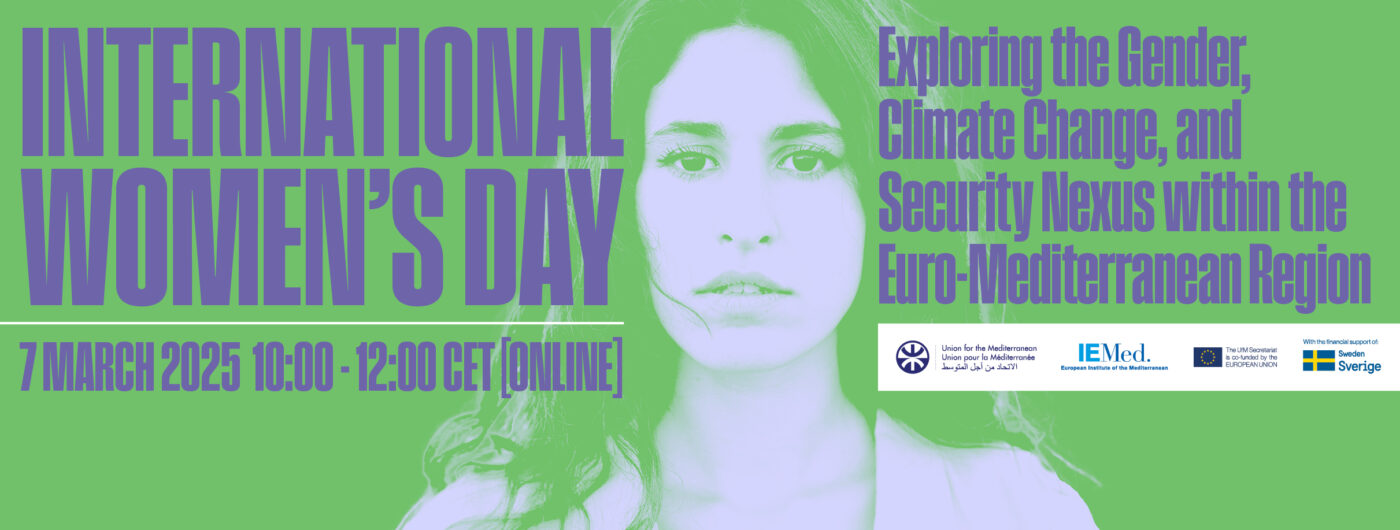
International Women’s Day Webinar explores the nexus between gender, climate change, and security
March 7, 2025, Barcelona – In celebration of International Women’s Day 2025, the Union for the Mediterranean hosted a webinar exploring the nexus between gender, climate change, and security, which gathered 230 registered participants. The recording of the session is now available for viewing and can be accessed by following this link.
The event brought together experts, practitioners, and activists to shed light on the interconnections between these issues, particularly in the Euro-Mediterranean region. The webinar also marked the official launch of the second UfM-IEMed MedWE Policy Paper: “Climate Crisis and Gender Equality in the Euro-Mediterranean Region – Emerging Security Risks.”
The webinar opened with remarks by UfM Deputy Secretary General for Social and Civil Affairs, Stephen Borg, who asserted that “the many challenges Euro-Mediterranean women face should be seized as opportunities to empower them as agents of change,” emphasizing the importance of the critical juncture women are facing today.
The panelists then opened the discussion by highlighting the role of climate change in intensifying existing inequalities and insecurities, acting as a stress multiplier. However, according to them, attributing regional instability solely to environmental factors while ignoring the impact of conflict oversimplifies the problem. Indeed, the speakers advocated for a comprehensive, intersectional approach that considers the overlapping dimensions of climate change, security, systemic inequalities, and socioeconomic factors.
Women in the MENA region, particularly those displaced by conflict and climate disasters, face increased risks of gender-based violence, exploitation, and poverty. The interventions emphasized the need to break down silos and meaningfully integrate diverse policy frameworks, such as the Women, Peace, and Security agenda.
The concept of the feminization of vulnerability was critically examined, noting that it often overlooks the nuanced realities and dynamics in the region. As more women take on roles as decision-makers, negotiators, breadwinners, and heads of households, especially in displacement contexts, their involvement in decision-making processes has proven crucial. As our panelists have stressed, sustainable peace agreements and climate adaptation projects are more effective and enduring when women actively participate. The UfM gender equality expert Anna Dorangricchia illustrated this point in her remark: “Women in our region have extraordinary capabilities, particularly when it comes to climate adaptation and peacebuilding initiatives, evidence of the critical role they play in society not as victims, but as much-needed leaders of change”
Moreover, the importance of gender-disaggregated data and evidence-based policies was put forward, as they are essential for ensuring the effectiveness and inclusiveness of climate action and peacebuilding. For example, the Sendai Framework for Disaster Risk Reduction was cited as a model for gender-responsive early warning systems.
With inspiring young women on the panel, the role of youth in climate and security discussions was another key topic. Their contributions underscored the need to move beyond tokenistic inclusion toward genuine co-ownership and co-design of initiatives, advocating for a youth-centric approach in policy and project design.
The webinar emphasized the significance of regional cooperation, diplomacy, and networks in addressing the interconnected challenges of climate change, security, and gender. Women’s role in water diplomacy and transboundary water cooperation was emphasized and applauded, as they are at the heart of efforts to negotiate and manage the use of limited water resources, being the primary water collectors in 7 out of 10 households in the region.
As the region faces escalating impacts of climate change and insecurity, the webinar reaffirmed the necessity of holistic, inclusive, and gender-transformative approaches to build a more resilient and equitable future.

